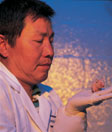 
Prostate
Progress
A
landmark experiment sheds light on how some prostate cancers become
untreatable - and how this deadly process can be prevented.
Xu Bao
Shi is checking on his mice. Housed in pairs, the rodents share
shoe-box-sized plastic containers in a squeaky-clean, climate-controlled
room on the UC Davis Medical Center campus.
They are nude mice, bred to be hairless. All are female. This morning
they’re napping in the wood shavings carpeting their containers,
grazing on food pellets or drinking from their water bottles. Shi,
a cancer research biologist, takes the lid off one of the containers
and scoops up a mouse. Cupping the red-eyed, pink-skinned animal
in the palm of his hand, he notes a pea-sized tumor, the color of
a bruise, on its hip. Shi returns the mouse to its container and
picks up its housemate. It, too, has a small bluish growth on its
flank.
The growths are tiny, but they represent a significant step forward
in prostate cancer research. They prove that p53 mutations play
a direct role in the development of androgen independence, a poorly
understood process that can render prostate cancer untreatable.
By identifying p53 mutations as a causative factor in this lethal
process, UC Davis Cancer Center researchers have moved medicine
one step closer to controlling it.
Nearly 190,000 men develop prostate cancer every year, and a substantial
proportion eventually wind up on a hormone treatment known as androgen
suppression therapy. The therapy works because prostate cancer cells
depend on testosterone, a type of androgen, for their growth. Depriving
the cells of androgen weakens or even kills them.
  

Home |
Table of Contents |
To our Readers |
Building on Basics
Focusing on Patients |
In Translation |
First Steps
Campus Connection |
Benefactors |
News in Brief
UC Davis Health System |
© 2000, 2001, 2002 UC Regents. All rights reserved.
|
 |



 

Through
animal research, Xu Bao Shi is learning what makes prostate cancer
untreatable.
|


